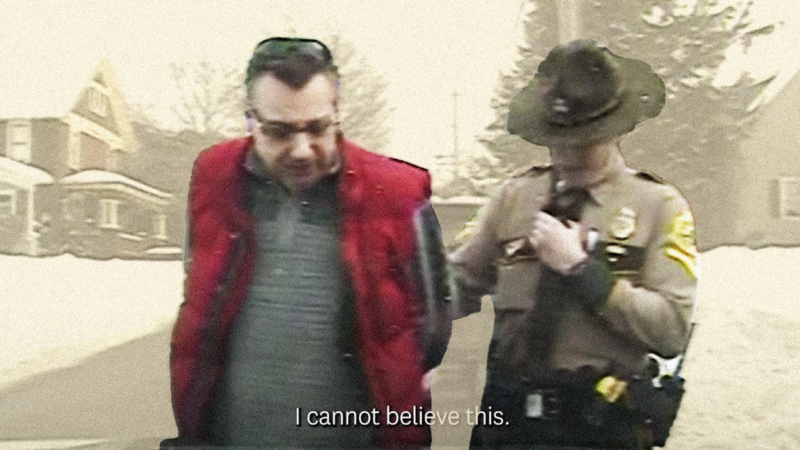Man Who Was Arrested for Flipping Off Cop Settles for $175,000
However distasteful, the First Amendment protects a citizen’s right to give a police officer the middle finger.

A man who was arrested and charged for flipping off a Vermont State Police (VSP) officer settled his case last month for $175,000.
"Far too often, police abuse their authority to retaliate against and suppress speech they personally find offensive or insulting," Lia Ernst, the legal director of the American Civil Liberties Union (ACLU) of Vermont, tells Reason about the case. "This settlement demonstrates that violating these rights does not come without a cost."
Through the settlement, Gregory Bombard will receive $100,000 in damages. The ACLU of Vermont and the Foundation for Individual Rights and Expression (FIRE), which both represented Bombard in his suit, will receive the remaining $75,000.
All told, Bombard spent "about a year fighting the criminal charges and more than three years seeking declaratory relief," a spokesperson for FIRE tells Reason.
Jay Riggen, the officer who arrested Bombard, "retired from VSP effective May 31, 2024," a spokesperson for the Vermont State Police tells Reason. "We have no additional comment on this case."
In February 2018, Bombard was stopped by Vermont State Trooper Riggen, who believed Bombard had given him the finger while driving—an allegation Bombard denies. However, after Riggen walked away from the car, Bombard flipped Riggen off and swore at the officer in frustration for having been pulled over.
In response, Riggen pulled Bombard over again and arrested him for disorderly conduct. "The first one may have been an error," said Riggen during the arrest, referring to the reason for the initial stop, but "the second one certainly was not."
Bombard's suit claimed that, error or not, the action is constitutionally protected. "Giving the 'middle finger' and using curse words to protest a police officer's actions constitute expression that is protected by the First Amendment," wrote Bombard's counsel in his complaint.
"The state settled in all likelihood because it was highly likely that a court would rule that Mr. Bombard's First Amendment rights were violated," Peter Teachout, a professor at Vermont Law School, says. "The First Amendment protects not only verbal communications but also 'expressive conduct,'" which could include gestures.
"There is, in fact, a significant body of First Amendment and Fourth Amendment case law generated by police retaliating against people who hurt their feelings—most of it firmly upholding the right to hurl choice words or gestures at public officials," wrote Reason's C.J. Ciaramella last year. That includes a 2013 decision from the U.S. Court of Appeals for the 2nd Circuit, which sided with a New York man who was arrested for giving a cop the middle finger, and a 2021 decision from the U.S. Court of Appeals for the 8th Circuit, which ruled in favor of a Minnesota man whom a police officer pulled over and arrested because he flipped her the bird.
In this case, Bombard's gesture expressed a very simple idea: distaste at Riggen for pulling him over. And, whether or not the officer knew it in the moment, expressions of such distaste are generally safeguarded by the First Amendment.
"Police officers can't (in theory) arrest you for annoying them or even angering them," Rebecca Tushnet, a professor at Harvard Law School, tells Reason via email. "You have the right to be vituperative as long as you are not threatening."


Show Comments (25)